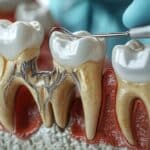Have you been told you have too much bone loss in your upper jaw for full-mouth dental implants? If so, chances are you would be a great candidate for zygomatic implants at New Teeth Now.
When compared to bone grafting and sinus lifts, the benefits of zygomatic implants are abundant:
- Less invasive than alternatives
- Stronger, more solid support
- Higher eligibility rate
- Fewer visits from start to finish
- Higher success rate than grafts alone
What Is a Zygomatic Implant?
Zygomatic implants are specialized implants designed for patients who do not have sufficient bone in the maxillary bone or upper jaw to support traditional implants. They are much longer than traditional implants and are placed at an angle to safely reach and integrate into the cheekbone, or zygoma.
An Implant Anchored in the Cheekbone
The zygoma is a dense and stable bone that provides additional support for the zygomatic implant. Below, you can see a virtual animation of the immediate loading of zygomatic implants to a full bridge of zirconia teeth.
Most People Are Eligible for Zygomatic Implants
Regardless of bone loss, most people are eligible for zygomatic implants. In part because of zygomatic implants, our oral surgeons are able to help patients who have been turned away by other implant providers. To date, at New Teeth Now, we have not had a patient we couldn’t help because of bone loss.
It’s common for people who need full-mouth dental solutions to be turned away from treatment because of pronounced bone loss in the upper jaw. Many of our patients have been told that relief can only be achieved through lengthy bone graft treatment, taking months or even years to complete. This traditional line of treatment is prescribed by dentists and oral surgeons who do not have the training or experience to perform a zygomatic procedure.
Bone loss is common in the case of long-time denture wearers, and for individuals who have had missing teeth over an extended period. Once a tooth and its root have been removed, the body responds by shutting down blood flow to the surrounding bone. This results in the bone receding over time. A significant lack of bone makes it difficult or impossible for an implant to be placed and remain stable.
The same factors commonly leading to bone loss in the jaw do not occur in the cheekbones. Our surgeons are highly skilled at finding enough bone in this region to provide patients with a real solution so they can finally have functional teeth again. In short, if you have cheekbones, you’re probably eligible for zygomatic implants.*
Zygomatic implants are a game changer for patients who fall into this category. There are important questions to consider before scheduling your implant surgery.
*Some medical exceptions still apply.
Support for Teeth the Same Day
Because of the strength of the implants and support from the implant site, patients are able to go home the same day as the procedure with new teeth. This is not always the case with an alternative or supplemental procedure that would otherwise rely on bone grafting, for example. And for patients who have experienced a complicated history of oral health problems, this can sound too good to be true.
The fact is, even during the healing period when your implants are integrating with your zygoma and jaw, you will have teeth and you will be able to eat real food with New Teeth Now.
Only for Upper Teeth Replacements
We are often asked this question at consults and online during our webinars. Functionally, the cheekbone cannot support implants in the lower mouth. This does not present an issue for our oral surgeons. Severe bone loss is more common in the upper jaw, and even with severe bone loss in the mandible, our surgeons are able to find enough bone in the lower jaw through techniques such as tilted implants.
Can a Zygomatic Implant Support a Single Tooth?
No. Zygomatic implants are utilized only during full upper teeth restorations. The angled loading of these implants will support a full upper bridge of prosthetic teeth. This technique is not appropriate for a single dental implant procedure.
Our Surgeons Specialize in Bone Loss and Zygomatic Implant Cases
Dating back to the 1990s, zygomatic implants are not a new procedure. They do require experience and skill to safely perform, which is why other implant providers will turn patients away without exploring the option.
Successfully placing zygomatic implants requires a substantial amount of training and expertise. This is a critical factor to consider when choosing an implant provider for your procedure. If you are a candidate for zygomatic implants, be sure to ask questions like:
- How many zygomatic procedures do you perform in a month? In a year?
- Do you perform guided surgeries on your patients?
- What is the percentage of your patients who experience failed implants or complications?
New Teeth Now surgeons place more zygomatic implants than any single oral surgery practice in the nation. Seeing several patients for zygomatic implants every month, it would be difficult to find a provider with more experience. Learn more about our zygomatic implant procedure while hearing from some delighted zygomatic implant patients.
In your research, you may discover some oral surgeons use guided surgery technology to perform this procedure. While convenient for the surgeon, this approach does have drawbacks, as it does not account for unforeseen challenges during your procedure. A seasoned, experienced surgeon can not only design a thorough, pre-op plan, but they are also capable of deviating confidently from that plan during surgery in order to ensure the best outcome.
High Success Rate
No surgical procedure has a perfect success rate. Over the years, New Teeth Now patients have consistently seen higher than the average benchmark 98% success rate for zygomatic implants. To improve these chances we are committed to providing the best in patient education and guidance in post-operative cleaning and maintenance guidelines during healing.
It’s not just about having a stellar success rate, which we do. Receiving new teeth is a journey that you won’t go on alone. Our surgeons and implant coordinators are available to answer patient questions throughout the process.
High-Quality, and Worth the Investment
The cost of zygomatic implants at New Teeth Now is a fraction of the cost of the full mouth implant procedure. We know that cost is an important consideration for our patients, which is why we take every opportunity possible to keep our fees lower without sacrificing safety or quality.
While a full mouth restoration has a significant price tag, it’s important to consider the costs of traditional dentistry like crowns, bridges, dentures, and partials. These solutions are also not cheap. In addition, traditional solutions are often short-lived. Crowns and bridges fail, and dentures get more and more problematic over time, requiring new fittings to compensate for bone loss This means you’ll likely have to return to a dental professional frequently for the rest of your life. Those dollars add up, and often you end up in the same situation as when you started.
A procedure requiring zygomatic implants is only slightly more expensive than a full mouth restoration with traditional implants. As a patient with bone loss, the upside is you do not have to endure the wait and the costs of bone graft treatments. In addition, placing an implant in a healthy, dense bone like the cheekbone, is often more favorable than relying on the stability of a bone graft.
A zygomatic procedure performed by an experienced, well-trained surgeon is a better overall investment in yourself than multiple, temporary, time-consuming traditional options.
A full-mouth restoration with implant-supported prosthetic teeth is a one-time fix for your oral health issues.
Research the Pros and Cons
As with any medical procedure, you must weigh the options presented by the doctors you’ve consulted and choose what’s best for you. Zygomatic procedures, while not rare, are not commonly done by other providers. They are more expensive than the traditional bone graft approach.
We have found that one of the greatest advantages for our patients is how regardless of bone loss we are able to give patients the experience of going home the same day of the procedure with new teeth. Being able to help patients who have been told they don’t qualify for new teeth is incredibly rewarding to our surgeons and our entire staff. If you’d like to learn more about our procedure, please get in touch during office hours to discuss your options.









